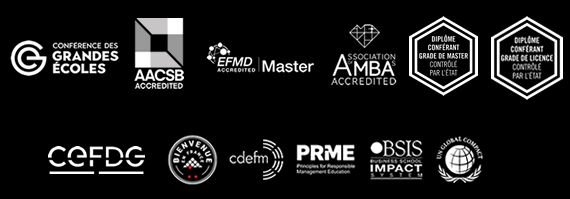Artificial intelligence is reshaping the world of work, but its impact extends beyond technology alone. The next generation of managers will operate at the crossroads of technological, environmental, and societal transitions.
Business schools such as EMLV are adapting their programmes, methods, and values to train professionals capable of understanding this complexity and leading responsibly in an uncertain future.
From Business as Usual to Continuous Transformation
The integration of AI into management, marketing, finance, and human resources marks the beginning of a deep structural shift. Automation and predictive analytics now influence decision-making at every level of an organisation. At the same time, companies must confront environmental and energy constraints that demand new models of growth and efficiency.
At EMLV, these evolutions are accompanied by concrete learning experiences such as the Data & GENAI Seminar at EMLV – Automation and Generative AI for Digital Marketing, held with IIM students of the dual degree in Digital Marketing & Data Analytics. Over four days, students alternated between lectures and practical sessions, following a learning-by-doing approach that covered workflow automation, data analysis, and use cases for generative AI.
In this context, future managers are expected to combine two forms of intelligence: analytical and relational. They must understand how algorithms operate, assess their ethical and social implications, and use them to create value without losing sight of human judgement.
The role of business education, therefore, is no longer limited to transmitting technical or managerial knowledge — it is about shaping professionals who can navigate and interpret technological change, balancing innovation with responsibility.
Artificial Intelligence: A Strategic Shift for All Business Functions
At EMLV, AI is not treated as a stand-alone subject or a technical module. It is integrated across programmes as a common foundation.
Students in marketing explore data-driven decision-making and the new frontiers of customer experience through generative and conversational AI.
EMLV has also developed an Introductory Programme to Artificial Intelligence for both students and teachers, aiming to explain how algorithms work, to master generative AI tools, and to reflect on the ethical and environmental implications of technology.
Those specialising in finance use AI models for forecasting, fraud detection, and sustainability performance tracking.
In human resources, the focus lies on algorithmic transparency and the fair use of data in recruitment or career management. Meanwhile, supply chain and operations courses incorporate predictive modelling, scenario simulation, and AI-driven resource optimisation.
Across all these disciplines, the message is consistent: technology does not replace managerial expertise — it amplifies it. The challenge is to understand the limits of automation while maintaining a human perspective in strategic decision-making.
Ethics, Regulation, and the Human Factor
The rise of generative AI raises new questions about authorship, trust, and bias. Business schools must therefore act as mediators between technological innovation and social responsibility.
To encourage critical thinking on these issues, EMLV promotes spaces for dialogue around AI topics. The round table “AI in education: Generative or degenerative?”, moderated by Peter Saba, lecturer and researcher at EMLV, gathered faculty and students from EMLV, ESILV, and IIM to discuss the role of AI in teaching and learning practices.
At EMLV, these issues are addressed both through dedicated courses and through a transversal reflection across disciplines. Students analyse real-world use cases and are encouraged to question the ethical dimension of decision-making powered by data and algorithms.
This approach aligns with the broader European context, where new regulatory frameworks such as the EU AI Act and the Digital Services Act are redefining how organisations collect, store, and process information.
Managers of the future will need to understand these frameworks, not as constraints, but as strategic tools for governance and trust.
Beyond Technology: Managing the Energy and Climate Transition
Artificial intelligence is not the only force transforming business. Climate change and the energy transition are reshaping the economy in parallel.
AI can support these transformations — by optimising energy systems, improving logistics, or predicting environmental risks — but it also carries a carbon footprint that must be managed.
At EMLV, sustainability and technology are not taught in isolation. The school emphasises the convergence of digital innovation and ecological transition. Students learn to measure the environmental impact of data infrastructures, to design low-energy solutions, and to integrate sustainability metrics into business models.
This dual perspective — combining digital and ecological literacy — prepares future managers to make informed, responsible choices in complex systems.
Hybrid Competencies for a New Generation of Decision-Makers
The future of management education lies in hybrid learning: the ability to think like an analyst, act like an entrepreneur, and collaborate like a designer.
Thanks to its multidisciplinary environment within the Pôle Léonard de Vinci, EMLV enables students to work alongside engineering and digital design students from ESILV and IIM. These cross-school projects foster collaboration between disciplines that traditionally operated in silos.
One illustration of this interdisciplinary approach is the IA-Focused Hackathons, where students from the three schools collaborate to explore how AI can be used ethically and inclusively. These hackathons challenge teams to create solutions addressing inclusion, sustainability, and transparency in AI applications.
This model reflects how innovation happens in companies today: at the interface between business strategy, data science, and user experience.
Through transversal projects, hackathons, and partnerships with major corporations, EMLV students are exposed to real-world challenges — from developing AI-driven marketing dashboards to designing immersive virtual training environments or assessing data ethics policies for HR departments.
Looking Ahead: The Manager of 2030
By 2030, management roles will be profoundly transformed. The marketing manager will act as a data interpreter, capable of reconciling machine predictions with human insight.
The financial controller will become a strategic foresight analyst, integrating ESG data and AI simulations into decision-making. The HR professional will evolve into a workforce architect, managing hybrid teams that combine human and artificial intelligence. And the Chief Sustainability Officer will work alongside the Chief Data Officer to align digital innovation with planetary boundaries.
The common denominator is adaptability. The capacity to learn, unlearn, and reconfigure one’s skills will become as valuable as technical expertise itself. Business schools have a key role to play in cultivating a lifelong learning and critical awareness mindset.
Preparing for a Responsible Digital Future
Preparing students to “succeed in the era of AI” no longer means teaching them how to use software. It means enabling them to understand, question, and lead technological change with purpose.
At EMLV, this translates into a model of education grounded in experimentation, interdisciplinarity, and social responsibility — a model that recognises the manager not as a spectator of innovation, but as a responsible actor in shaping its outcomes.
As AI, climate, and energy transitions converge, the role of business schools becomes clearer: to equip future leaders not only with digital skills, but with the ethical and strategic intelligence needed to build resilient, sustainable organisations.



















